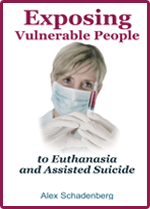The following article was written by Wesley Smith and published on February 22 under the title:
Euthanasia Euphemisms.
 |
| Wesley Smith |
Wesley Smith, February 22, 2013
When a social movement must rely on euphemisms to obfuscate its goals, it is a good bet that there is something wrong with its agenda. From the very beginning of the modern movement, euthanasia advocates have euphemistically bent language as a means of convincing society to endorse
killing—an accurate and descriptive term that simply means to end life—as an acceptable method of ending human suffering.
Euthanasia, from the Greek, literally means “good death.” As the historian Ian Dowbiggin has
noted, the term once described “a calm and easy” natural death at home, “so family members and friends could say their farewells.”
That changed after an 1870 essay by a teacher named Samuel D. Williams was published arguing that the value of human life depends on whether it is “worthwhile”— an idea known today as the “quality of life ethic” — and moreover, that mercy killing and assisted suicide should be allowed for those who are “hopelessly suffering.” The essay went viral —to use today’s terminology—and within a few years, the word euthanasia had taken on its modern meaning. The euthanasia movement has been coining new definitions and idioms ever since.
The movement’s latest euphemistic phrase is “aid in dying,” promoted most prominently by the (euphemistically) named assisted suicide advocacy organization Compassion and Choices (which came into being after a merger with the more descriptively named Hemlock Society). According to C&C, when a terminally ill patient swallows an intentionally prescribed lethal overdose of barbiturates, it isn’t really suicide. Why? Because the word “suicide” has negative connotations, and C&C wants people to feel positive about some self-killings.

Here’s the idea: A terminally ill patient doesn’t really want to die, but has no choice. Hence, taking an intentionally prescribed lethal overdose of “medication”— another euphemism, since the purpose is not to treat but to poison oneself—doesn’t constitute suicide. Thus, in a C&C press release from a few years ago boosting use of “aid in dying,” the (late) Peter Goodwin, a prominent assisted suicide-participating doctor, said, “As a physician, I resent the term ‘physician-assisted suicide.’ I never felt I was assisting a suicidal patient, but rather aiding a patient with his or her end of life choice.” Since then, “aid in dying” has become ubiquitous in media stories and assisted suicide advocacy.
Note that Goodwin’s complaint had nothing to do with accuracy and everything to do with emotions. He “feels” rather than “thinks.” And that’s how C&C wants listeners and readers to react—emotionally rather than rationally—toward the end that people are more likely to approve of legalizing assisted suicide if it isn’t called what it actually is.
But surely, accurate language must still mean something in public policy debates. Suicide is
defined as “the act or an instance of taking one’s own life voluntarily and intentionally especially by a person of years of discretion and of sound mind.” Thus, under C&C’s reckoning, if the distraught owner of, say, a failed business intentionally takes an overdose of prescribed sleeping pills, it’s suicide. But if the same man takes the pills because he has cancer, and the doctor prescribed the pills for that purpose, it isn’t suicide. That’s nonsensical.
Assisted suicide proponents claim that changing the lexicon is necessary to avoid furthering a supposed stigma associated with suicide. I am not sure whether that stigma exists anymore. But if some suicidal people don’t kill themselves because they worry what others might think, why is that so bad? I mean, the outcome is a saved or extended life. Indeed, many once-suicidal terminally ill people later come to be glad that they didn’t do the deed. Aren’t their lives worth protecting?
I want to make it very clear that I don’t think we should judge or condemn anyone who is suicidal or commits suicide. None of us knows what our own emotional limits might be. Given sufficient despair, fear, or pain, any of us might be attracted to the siren song of self-destruction. The good news is that such causes of despair can often be treated and overcome—including in the dying.
The real issue, then, is how we react to our brothers and sisters who have fallen into a darkness sufficient to make them want to end it all. Should we engage in suicide prevention for all, or only for some? I believe that the dying deserve to have their suicidal desires treated just as seriously as the despairing widow or the troubled teen.
That’s certainly the hospice
philosophy, the truly compassionate approach to terminal illness. In contrast to assisted suicide—which is about dying—hospice is about
living. Hospice does not seek to simply “extend life” but maintain its quality to the natural end, and that explicitly includes suicide prevention.
Assisted suicide
is suicide.The term is descriptive and accurate. When legalized, it amounts to state-approved suicide, an issue too culturally consequential for us to allow gooey euphemisms to serve as the sugar that helps the bitter hemlock go down.
 A tremendous victory in Montana!!!
A tremendous victory in Montana!!!


























